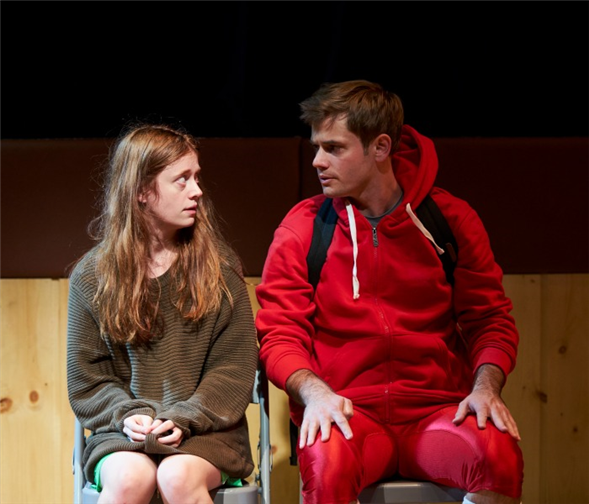Translate Page

Playwrights Realm's new show examines the aftermath of a high school sexual assault
---
You don't expect a play dealing with rape to contain much humor. But little about The Rape of the Sabine Women, by Grace B. Matthias is conventional. Produced by Playwrights Realm, a theatre company devoted to early career dramatists, the show uses satire and dark comedy to tell the story of a teenage survivor of sexual assault. Its author, Michael Yates Crowley, was inspired to write the play while watching coverage of the notorious Steubenville, Ohio rape case in which two high school football players sexually assaulted an unconscious 16-year-old girl and shared recordings of the incident on social media.
"I remember feeling both shocked by what happened and how it was covered, and also, I went to a high school that had a big football team, so I knew these people," says Crowley. While he's a male playwright tackling a hot-button issue in an era when many feminists believe #AllMen are responsible for rape culture, he didn't let that deter him. "I think of it less as who is qualified to speak about rape and more as who is allowed to be silent," he says. "I want to live in a world in which it is not up to survivors of sexual assault to be the only voices talking about it."
Over the course of two hours, Crowley's gutsy play follows 15-year-old Grace (The Wolves' Susannah Perkins) as she copes with the aftermath of rape. As high school football heroes Jeff (Doug Harris) and Bobby (Alex Breaux) face indictment, Grace must contend with absentee parents, a lawyer who wants to play up her victimhood, a guidance counselor who doubts her, and a community that's irate about her tarnishing the beloved team's image.
For Crowley -- a Juilliard grad who developed the play during his tenure as a Playwrights Realm writing fellow -- comedy became a tool to make a difficult topic palatable. There are many absurdist moments, such as Grace interacting with anthropomorphized entities like 'The News' and Wikipedia, or when her guidance counselor cries, "Please don’t get emotional! I can’t handle when students get emotional." "The humor's a huge part of the play," Crowley says. "It's a way of inviting people in to talk about something, and trying to get around the fixed positions that people hold on a lot of these issues."
Jeff and Bobby, for example, aren't simply bad guys; they're teenagers dealing with the pressures of growing up. "I think that's hugely important," adds director Tyne Rafaeli. "These events are not perpetrated by villains in our midst. It's people we recognize in our lives that -- under a certain set of circumstances -- could end up doing something terrible. That's what this play absolutely cracks open. How can we create a culture in which that doesn't happen?"
{Image1}
An American who was raised in England, Rafaeli believes the high school sports scene in this country contributes to rape culture. "The sense of entitlement and hierarchy that comes inside of a sports culture, and how that manifests for young people in high school is, I feel, a uniquely American experience," she says. Rafaeli views the football players' status as royalty as impacting the way Jeff (who seems genuinely fond of Grace) and Bobby (who calls her a pig) behave off the field. "To be a good [football player], you need a certain amount of aggression and confidence and a sense of infallibility," she says. "You are going out there and getting what you deserve -- which is victory -- and if you put that psychology in other contexts it gets very, very scary."
As the title of the play implies, the work also frames rape in a historical context, drawing parallels between today's scholastic football heroes and ancient Roman soldiers. After studying the famous painting "The Intervention of the Sabine Women" in class, Grace becomes fascinated with their tale of being kidnapped and forced into marriage by the Romans. One particularly moving scene has Grace asking Hersilia, who's prominently featured in the painting, what her life was like after she married her abductor, Romulus.
While Sabine Women doesn't offer easy solutions for dismantling rape culture, it is not without hope. "One thing that I'm slightly optimistic about is that the level of noise around this issue seems to have risen lately," Crowley says. "I think that can only be a good thing."
Rafaeli agrees. "To try and unpack systems of oppression you have to really look back to where these foundational value systems were created, and I find that extraordinary in this piece," she says. "I think there's optimism in recognizing where the root of the problem is."
---
TDF MEMBERS: TDF MEMBERS: At press time, discount tickets were available for The Rape of the Sabine Women, by Grace B. Matthias. Go here to browse our current offers.
Follow Diane Snyder at @DianeLSnyder. Follow TDF at @TDFNYC.
Top image: Susannah Perkins and Doug Harris. Photos by Daniel J. Vasquez.